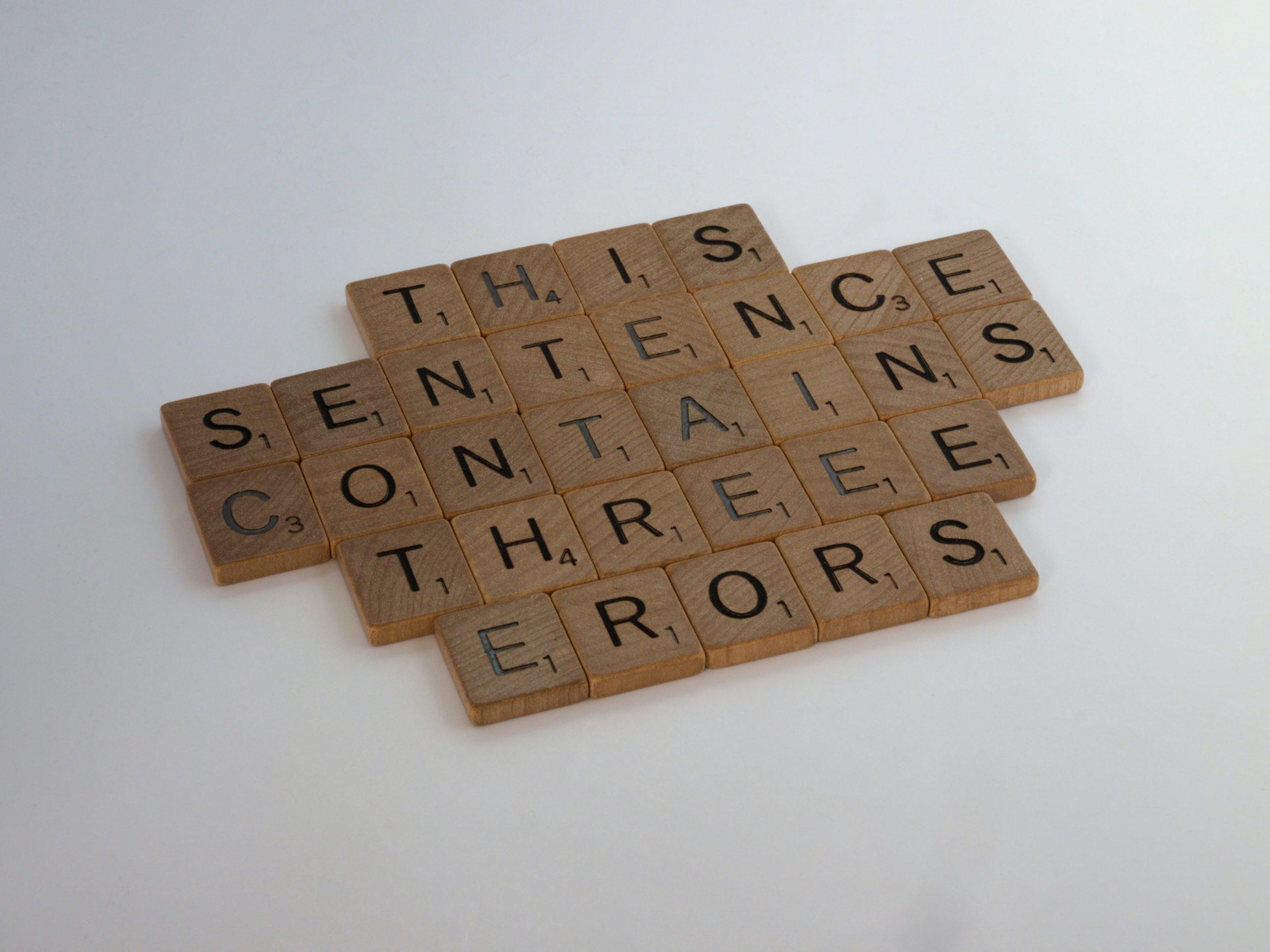Chapters
Grammar is a huge part of written language, and makes up part of your GCSE grade. On top of this, it is crucial that you are able to communicate effectively, and good grammar is really the only way that you can do this in your writing.
If you find grammar to be difficult, you may need to work on this skill. There are plenty of books on grammar and specific GCSE study guides, but one of the best ways to improve the skills you have is to read.

Common Grammar Errors

Common grammar errors can vary depending on the language proficiency and writing habits of the individual, but there are several errors that tend to happen frequently in written and spoken English. By knowing the common errors that people tend to make, there is a high chance that you can stamp out some of the bad habits.
Here are some of the most common grammar errors:
Subject-Verb Agreement: This error occurs when the subject and the verb in a sentence do not agree in number. For example, "The dogs is barking" instead of "The dogs are barking."
Double Negatives: Double negatives are grammatically incorrect because they cancel each other out, leading to a positive meaning. For example, "I don't need no help." Some people use double negatives conversationally too, which can lead to it creeping into written work.
Misplaced or Dangling Modifiers: Misplaced modifiers can create confusion when they are not located next to the word they are supposed to modify. For example, "Running quickly, the car was seen by the police" instead of "The car was seen by the police while running quickly."
Pronoun-Antecedent Agreement: This error happens when pronouns do not agree in gender, number, or person with their antecedents. For example, "Each student must bring their own book" instead of "Each student must bring his or her own book."
Run-On Sentences: A run-on sentence occurs when two or more independent clauses are incorrectly joined without appropriate punctuation. For example, "I went to the store I bought some groceries."
Sentence Fragments: A sentence fragment is an incomplete sentence that lacks a subject, verb, or both. For example, "Because I was tired."
Apostrophe Errors: Misuse of apostrophes is common, including its misuse in possessive forms and contractions. Some people forget to use apostrophes at all. For example, "The dogs collar is blue" instead of "The dog's collar is blue."
Confusing Homophones: Homophones are words that sound the same but have different meanings and spellings. Confusing words like "their," "there," and "they're" or "your" and "you're" are common errors.
Verb Tense Errors: Inconsistent verb tenses within a sentence can create confusion. For example, "She will have a meeting and was attending a seminar" instead of "She will have a meeting and will attend a seminar."
Confusing Its and It's: "Its" is the possessive form of "it," while "it's" is a contraction for "it is" or "it has." Mixing up these two can lead to errors like "The cat is licking it's paw."
Incomplete Comparisons: Incomplete comparisons happen when comparing two or more items, and the sentence does not clearly state what is being compared. For example, "She is taller than her." As you can see, this doesn't really get the intended meaning across.
Incorrect Word Usage: Using the wrong word that sounds similar to the correct word is another common error. For instance, using "effect" instead of "affect" or "their" instead of "there." There, they're, and their are commonly misused words.
Articles (a, an, the) Errors: Not using articles correctly can lead to awkward sentences. For example, "I saw a interesting movie last night."
Word Order Errors: Placing words in the wrong order in a sentence can lead to confusion. For example, "He takes every morning a walk in the park."
Understanding Word Classes
Word classes are crucial to understand. They make up the basic elements of sentences.
Nouns: Nouns are words that represent people, places, things, or ideas. They serve as the building blocks of sentences and can function as the subject or object of a sentence. Examples include "cat," "Paris," "love," and "television."
Adjectives: Adjectives are words that describe or modify nouns and pronouns. They provide additional information about the noun, such as its colour, size, shape, or quality. Examples include "red," "big," "round," and "tasty."
Verbs: Verbs are action words that express what a subject is doing, has done, or will do. They are the heart of a sentence and convey the main action or state of being. Examples include "run," "sing," and "try"
Adverbs: Adverbs are words that modify verbs, adjectives, and other adverbs. They provide information about how, when, where, or to what extent an action or quality is happening. Examples include "quickly," "here," and "very."
Prepositions: Prepositions are words that show the relationship between a noun or pronoun and other words in a sentence. They indicate location, direction, time, and more. Examples include "in," "on," "under," "before," and "between."
Tips For Improving Your Grammar

Grammar is crucial for GCSE English, but it is also very important for other subjects, as you will need to be able to clearly communicate using the written word.
What are some of the key ways that you can improve your grammar skills and get more used to the English language, its structure, and rules?
Read Regularly
Reading books, newspapers, magazines, and well-written online articles exposes you to proper grammar and usage. It familiarises you with correct sentence structure, word choice, and punctuation.
GCSE Workbooks
There are specific GCSE revision books and workbooks that can help you to improve your skills. These are also built specifically for the GCSE qualification, so they will help you to work on the skills you will need for your English qualification (and other GCSEs).
Writing Regularly
This is one of the best ways to improve grammar. Simple diary entries or essays may be a good way to improve your grammar skills, and you can gradually work your way up to more complex writing. Proofread and edit your work, paying particular attention to grammar, and if you are working with a tutor you can get them to check your work.
Grammar Apps and Tools
There are numerous grammar-checking apps and tools available, such as Grammarly. They can help identify and correct grammar errors in your writing, offering explanations for improvement. Remember that these tools won't be available to you in exam settings, so it is really important that you learn from the mistakes you are making.
Seek Feedback
Ask your teachers to review your writing and provide feedback on grammar. Constructive criticism is valuable for identifying areas that need improvement. English teachers will leave you tips on coursework and other essays you write.
Conclusion
There are so many different aspects of grammar, and it is impossible to condense them all into one simple guide like this, but by working out the common mistakes you make, and addressing them, it is possible to greatly improve your grammar skills. Be sure to seek feedback from teachers, and make use of tools like Grammarly to help you to work on your abilities.
Summarise with AI:












